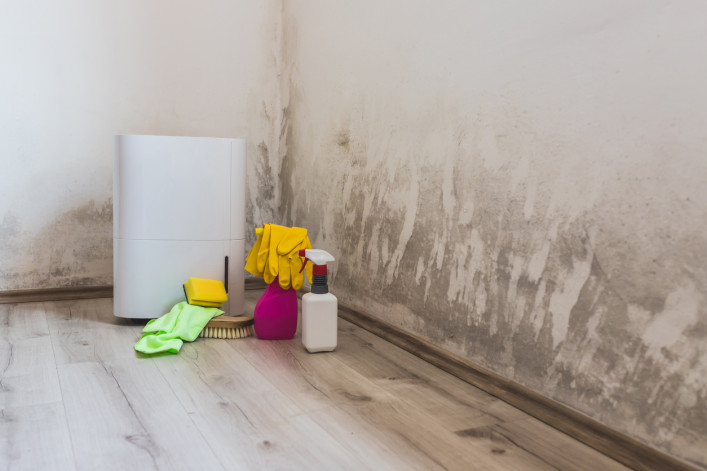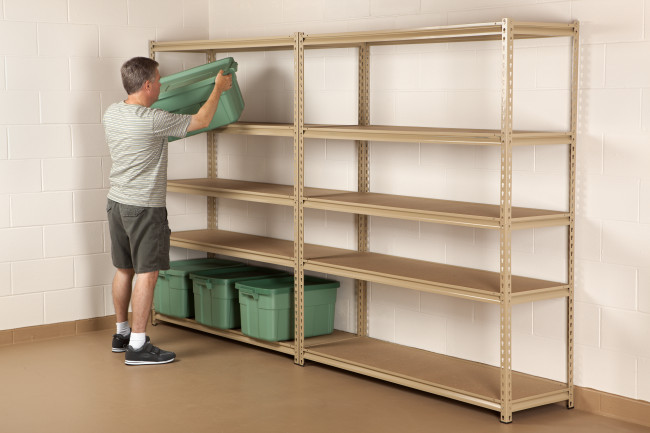Why you should ask about flooding and mold before you sign a lease
- The law requires landlords to share information about a building’s history of natural flood events
- But they're not required to voluntarily disclose floods caused by mechanical or plumbing issues
- Your questions about flooding and mold are supposed to be answered truthfully

See signs of mold or water damage when touring an apartment? Ask whether a building has a history of flooding.
iStock
Several years ago, I was checking out a duplex for rent and noticed some tiny black spots on the wall in the basement—it looked like mold. I pointed them out to the agent showing us the place. She insisted it was dust from a recent renovation and said the apartment (consisting of a ground floor and basement level) would be thoroughly cleaned before we moved in.
That was red flag number one. Red flag number two was her parting piece of advice as we left her to meet the owner and sign the lease: “The owner doesn’t like a lot of questions, so if you want the apartment, don’t bug him.”
[Editor's note: A previous version of the article ran in August 2023. We are presenting it again with updated information for February 2025.]
You can probably guess how this all went down. I was too chicken to press the issue during the rental process, only to find out later it was mold. In fact, the basement level flooded every time there was a hard rain.
With flooding an increasing concern in New York City because of climate change, my approach was exactly what you should not do. While an owner is required to disclose a building’s history of natural flood events thanks to a 2023 law, they are not required to volunteer information about floods due to mechanical or plumbing issues. Instead, the burden is on you as the renter to ask.
That’s because in New York, the law is caveat emptor, or buyer beware. The rule doesn’t just apply for buyers—it extends to renters as well, Steven Kirkpatrick, a partner at the real estate law firm Romer Debbas, explained to Brick.
“If the question is asked, then it has to be truthfully and accurately answered,” Kirkpatrick said. In other words, an owner can’t conceal information once they are queried.
If you see (or smell) something, say something
When you find yourself in my shoes, you know what to do. “If you see markings on a wall that could be caused by water damage, you should ask,” he said.
You should also use your sense of smell—if a place smells like mold or damp, that is another sign you need to ask about flooding. "The nose does not lie," Lawrence J. Ubell, president of Accurate Building Inspectors, previously told Brick.
Ideally, you should communicate with an owner or building manager in writing “so there’s no misunderstanding,” he said. “The best thing you can do is ask in writing and trust your own eyes,” Kirkpatrick said.
NYC owners are required to disclose information about lead remediation and bedbugs upfront—that's why when you sign a lease you will get additional paperwork attached to your lease. You should receive a similar document outlining your building’s past history with natural floods—those from rainwater or storm surge—which can require extensive repairs and pose serious health risks from mold. You can also look up information about any address via Brick Report.
“I’ve dealt with a top-floor apartment where someone repainted the ceiling to cover up damage from a leak,” Kirkpatrick said. “That requires major work to deal with.” Remediating after a flood can involve strategic demolition to access the drywall.
Keep in mind that in a competitive rental market like NYC, asking lots of questions about potential problems with an apartment may mean you lose the place to another renter who is willing to look the other way.
“But do you want a place with leaks?” Kirkpatrick asked. “These issues are, on a practical level, tough to deal with, and can be expensive too—although if you’re a renter, the owner is responsible.”
Want to get a comprehensive report on the potential issues with a building before you rent or buy it? Run the address through the Brick Report and get a real estate background check built from all of New York City's Open Data in one place. Brought to you by Brick Underground.
How to research a building's flooding history
If you want to do your own research, you can check tenant reviews on websites like openigloo to see if a building has a history with floods, leaks, and mold. You can also look up the address to see if it is in a flood zone, though New York’s flood disclosure law requires that your landlord inform you if your apartment is on a floodplain as defined by the Federal Emergency Management Agency. Checking whether a building has violations or complaints is also helpful—you can do this on the Department of Buildings website.
"It’s not only important to know if a space is prone to flooding, but to get insight into how the property management responds to such incidents," says Allia Mohamed, CEO of building review and listings site openigloo.
Here's an openigloo reviewer's experience with flooding in a new development in Crown Heights, where rents start at $3,000.
"Every time it rains we get upwards of three inches of rain throughout the unit. Severe flooding happened six times in 2024...In the summer, when it rains, it floods from the electrical room into the unit. 311 inspectors told us the conditions were dangerous because of loose wires in the room where the sump pump is, and chemicals that spill from the room (it's a mess). We haven't confirmed mold but it smells pretty awful."
Protections for renters
Renters are protected by the warranty of habitability, a set of requirements that landlords must abide by in order to keep your apartment and the building safe and livable at all times. In case of a flood, owners are required to clean up and address damage and mold.
But you should also be aware that damage in a basement caused by storm water is not covered by insurance, even under a flood policy, says Jeffrey Schneider, president of Gotham Brokerage.
However, some apartment insurance policies might provide limited benefits in some scenarios, so it is worth looking into. Sometimes you have limited and minimal flood coverage in a storage location, he says.
For renters who are moving into a building with a history of flooding from broken pipes, there’s at least this (sort of) good news: “A building's general history of water damage from broken pipes is not grounds for not writing insurance,” at least for now, Schneider says. “However rates have gone up appreciably in areas that have older buildings with claims from old pipes bursting.
You Might Also Like




























